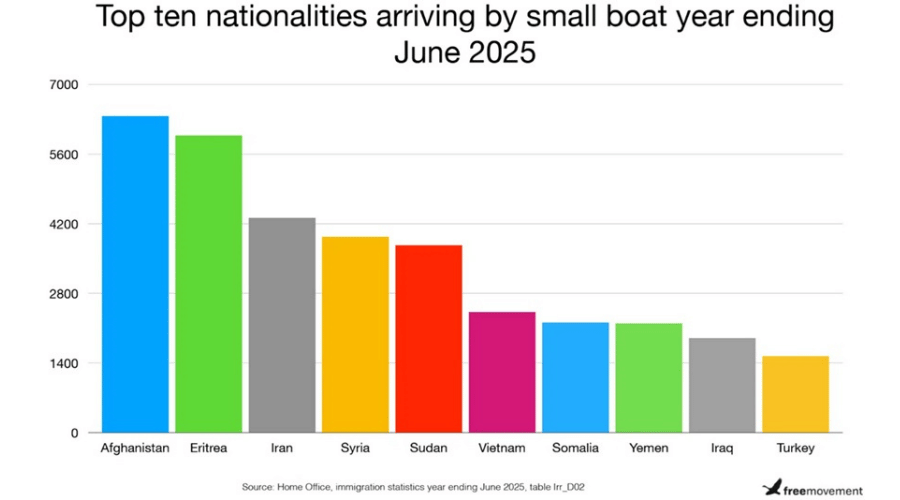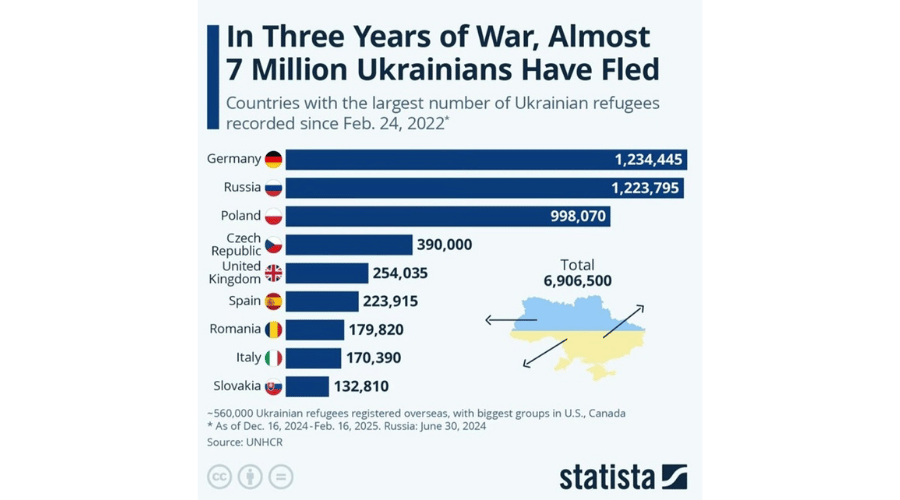Refugee homelessness and the UK response to world crises
End of the 56-day move-on period for most refugees
Having welcomed the trial extension of the move-on period from asylum accommodation that kept it at 56 days, the sector reeled from the announcement that for most refugees the trial has ended. Charities warned that homelessness would increase as a result. Back in 2023 the Home Office shortened the move-on period with the same aim: to cut numbers in hotels. This resulted a 200 per cent increase — to 2,370 households — of those who needed homelessness ‘relief’. NACCOM and Homeless Link commented on the latest change: “We are appalled by ministers’ decision to revert to the 28-day notice period for refugees with the fewest options available to them, who are at most risk of homelessness and destitution.” A letter protesting about the change, signed by CIH and other bodies, was sent to the government and covered by the Guardian.
A reduced move-on period for refugees and barriers to undocumented people being unable to regularise their immigration status means homelessness will remain a prevalent social issue in the UK, writes Ramfel’s Louisa Thomas. In Scotland, The Herald noted that Keir Starmer had rejected the city’s plea to intervene in Glasgow’s escalating refugee homelessness crisis, despite warnings the city faces a £109 million bill.
This comes after our summer newsletter highlighted the work of the Boaz Trust in Manchester and its advocacy of a longer move-on period. For this issue, Sue Lukes has updated her guide to hotel evictions, which is aimed at helping refugees avoid homelessness.
In this Housing Diversity Network webinar, speakers from Refugee Action, the No Accommodation Network (NACCOM), and Abigail Housing discuss how the refugee housing emergency intersects with the broader UK housing crisis, and explore what’s needed — in policy, practice, and mindset — to deliver meaningful change. The video of the seminar is free to access until the end of October.
Tabby Pinto at Deighton Pierce Glynn is looking into challenging the reduced move-on period. She is looking for cases where people won’t be in priority need and will be impacted by the move-on day period reduction. Contact: tpinto@dpglaw.co.uk.
Responding to world crises
Free Movement updated its guide to the safe and legal routes by which people can seek asylum in the UK. Below we look at the latest news on UK responses to refugee needs across the world.
A Home Office letter on 23 September summarised recent figures on refugee resettlement:
“Between 2010 and 2025, we have welcomed more than 711,000 individuals to the UK who have fled wars from Syria, Ukraine and Afghanistan, as well as those from Hong Kong. Under the UKRS, we have resettled nationals from Burundi, China, the Democratic Republic of Congo, Eritrea, Ethiopia, Iran, Iraq, Jordan, Kenya, Pakistan, Rwanda, Somalia, South Sudan, Sudan, and Yemen.”
It added that, while there is currently no 2025/26 quota for new referrals for resettlement, there continue to be arrivals under the scheme.
Free Movement produced a handy chart showing the origins of recent asylum seekers. Almost all come from war-torn countries, often those (Afghanistan, Iran, Syria, Somalia, Yemen, etc.) subject to recent military intervention by either the UK or the US).

Meanwhile, the EU’s anti-migrant policies, reliant on repressive measures by countries to the south of the Mediterranean, appear to be working, according to The Economist (paywall). In the first eight months of 2025, ‘illegal’ entries to EU countries were 21 per cent lower than in the same period in 2024.
Afghanistan
Latest asylum statistics show that for people from Afghanistan claiming asylum, the grant rate fell from 96 per cent in the year ending June 2024 to 40 per cent in the year ending June 2025. Care4Calais says: “This isn’t just a statistic; it’s a devastating blow to people escaping one of the world’s most volatile nations.” The Observer commented: “Can’t stay, can’t return: thousands of Afghans stuck in limbo in the UK.”
A blog in Sounddelivery Media shares first-hand insights from an Afghan refugee on the realities and concerns facing their community since the fall of Kabul. In recent news, a judge in Afghanistan successfully challenged a Home Office decision to refuse to bring him to the UK under the ARAP scheme.
Latest statistics on homelessness show 1,358 Afghan households accepted under the ACRS/ARAP schemes in England had been owed a prevention/relief duty by July this year, around 50 more than in April. Not surprisingly, most become homeless when moving on from Home Office bridging accommodation.
The Independent shows how Afghans who fought with Britian and the US are being identified and killed by the Taliban.
Palestine
Some 210 Palestinians arrived in the UK via small boat in the period April–June 2025. There has been a steady increase each quarter since the end of 2023, although this most recent figure shows a large increase from the 56 who arrived in the previous quarter.
Manar al-Houbi, a woman living in a tent in Gaza, who has been given entry to the UK to study for a PhD at Glasgow University, has been refused permission to bring her family with her, despite this being allowed by current rules. In September, the first group of university students from Gaza arrived in the UK after months of campaigning by politicians, academics and activists.
The call for a UK family scheme, similar to that for Ukrainians, has been taken up by openDemocracy: “With dozens of children dying in Gaza every day, the UK must show the same flexibility it demonstrated in past crises.” But so far, the government has created only a very limited scheme for children needing specialist medical treatment. It is expected to help only between 30 to 50 young people, the first of whom arrived with their families in September, initially for a two-year stay.
Ukraine
New statistics (see chart) show the staggering number of Ukrainian refugees (almost seven million) now spread across Europe.

Syria
A new report from the UN refugee commission looks at the experiences and intentions of Syrians across 13 European countries and makes recommendations to state authorities.
Hong Kong
Allowing Hongkongers who have moved to the UK to stay permanently after five years could net more than £4bn for the Treasury by 2029, according to analysis by the China Strategic Risks Institute. The move could raise almost as much revenue as a year’s worth of air passenger duty by enabling Hongkongers to move their pension savings here.
Sudan: a refugee story
In the Guardian, Mohanad, who was a medical student in Sudan, tells his story about why he fled, how he reached Britain and what happened next.



